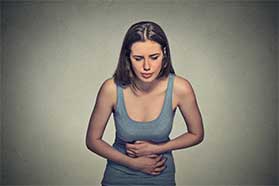Gut Dysbiosis Treatment in Fishers, IN

Your gastrointestinal (GI) tract, also referred to as the gut or digestive system, is home to roughly 500 different strains of bacteria—both good and bad—which make up your gut flora (gut microbiota). This bacteria, when in balance, aids in proper nutrient digestion, and plays an important role in immune function, vitamin synthesis and energy metabolism.
Dysbiosis occurs when there is an imbalanced ratio of good and bad bacteria in the gut, causing the pathogenic bacteria to flourish and invoke a slew of unpleasant symptoms. Severe or chronic dysbiosis can cause serious disease that negatively impacts the entire body, which is why it is important to never let your GI discomfort go untreated.
To schedule a consultation with an integrative healthcare professional in Fishers that specializes in gut dysbiosis treatment, call (765) 259-0545 or contact Charles Turner MD online.
Dysbiosis Causes
With modern medicine has come the frequent use of antibiotics to control bacterial infections. However, antibiotics do not simply kill bad bacteria; they destroy good bacteria too. Unfortunately, even viral illnesses are often treated with antibiotics despite their use in viral infections proving virtually ineffective. As a result of this overzealous antibiotic use, dysbiosis can occur and, as dysbiosis suppresses your immune system, it may consequently cause the need for future antibiotic use as your susceptibility to illness increases. Additional causes and contributing factors of dysbiosis include:
- Prescription and over-the-counter drugs like proton-pump inhibitors, NSAIDs and antacids
- Poor dietary choices, particularly excess sugar or alcohol consumption
- Stress
- Environmental toxins
Dysbiosis Symptoms
There are many symptoms which can occur both in the gut and in the rest of the body which could indicate you are suffering from dysbiosis. The most frequently experienced dysbiosis symptoms include:
- Digestive issues like diarrhea, constipation, bloating, abdominal pain, flatulence, indigestion, acid reflux, bad breath or nausea
- Weight fluctuations
- Fatigue and brain fog
- Low libido
- Food allergies and sensitivities
- Skin concerns like acne, rosacea or eczema
- Candida overgrowth
- Diminished mood
- Vaginal or anal itching
- Susceptibility to colds, the flu and sinus congestion
Left untreated, dysbiosis can lead to more troubling health conditions including leaky gut syndrome , autoimmune diseases, fibromyalgia and chronic intestinal infections.
Dysbiosis Diagnosis
If you experience frequent gastrointestinal discomfort, it is important to meet with a healthcare professional who can help to address your health concerns. If dysbiosis is suspected, your healthcare provider will likely utilize a diagnostic test called a comprehensive digestive stool analysis (CDSA). A CDSA will evaluate your digestion and absorption abilities along with your bacterial balance. Your healthcare provider may also recommend additional testing like candida testing or a hydrogen breath test.
Dysbiosis Diet & Lifestyle Modifications
An important part of your dysbiosis treatment is identifying what drives your dysbiosis symptoms. Together with your healthcare provider, you will discuss your antibiotic use, dietary choices and other lifestyle habits which are contributing to poor gut health.
Diet modifications are critical to your dysbiosis treatment and overall GI health. Limiting sugar, alcohol and caffeine can help improve your symptoms. It is also important to identify any food allergies, sensitivities or intolerances and remove them from your diet. Your healthcare provider may recommend allergy testing or an elimination diet in order to properly identify these irritants. Beneficial foods to consume regularly with your dysbiosis diet include:
- Dark green leafy vegetables and root vegetables
- Wild caught fish
- Organic, grass fed meat
- Prebiotic and fermented foods
Adhering to a healthy diet is not the only way to improve dysbiosis symptoms. There are several natural treatments for dysbiosis which can help to improve symptoms more rapidly. These include:
- Supplementing the diet with probiotics to rapidly restore good bacteria in the gut
- Taking other helpful dietary supplements which promote healthy GI function including glutamine, zinc, psyllium husk (fiber), N-acetyl glucosamine and digestive enzymes
- Homeopathic remedies
- Increasing physical activity
- Improving your immune health
- Reducing stress levels through yoga, meditation or acupuncture
It is important to only take dietary supplements recommended by your healthcare provider. Particularly, probiotic supplements are created with different potencies, probiotic strains and overall quality. You do not want to take a probiotic supplement which may cause you further discomfort or fail to improve any of your symptoms.
Don't let poor gut health jeopardize your overall health. Schedule an appointment with a healthcare clinic in Fishers that can provide effective dysbiosis treatment, call (765) 259-0545 or contact Charles Turner MD online.
Innovative Medicine
Address
3554 Promenade PkwySuite H
Lafayette, IN 47909
(765) 259-0545
www.innovativemedicine.org
Hours
Mon:
8:30 am - 5:00 pm
Tue:
8:30 am - 5:00 pm
Wed:
8:30 am - 5:00 pm
Thu:
8:30 am - 5:00 pm
Fri:
Closed
Sat:
Closed
Sun:
Closed
